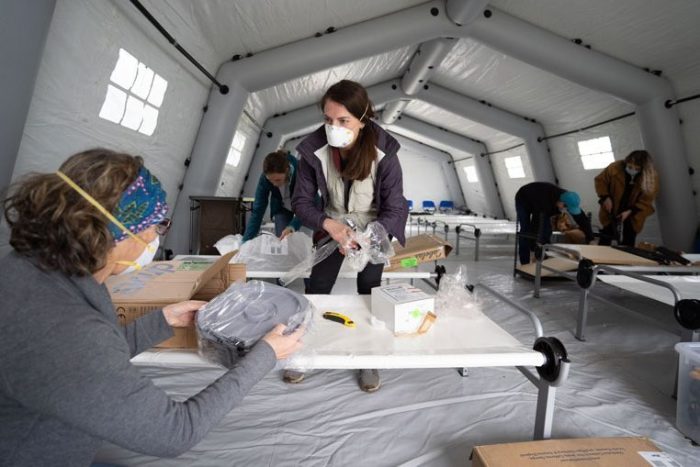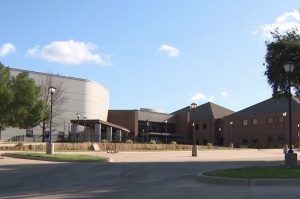9 ways people can help during the coronavirus outbreak

With over 2 million cases of novel coronavirus worldwide and stay-at-home orders shutting down schools and businesses, many at home are looking for ways they can do their part to help those most impacted by the pandemic.
As an increasing number of people face financial struggles, there are a number of charities, churches, and individuals out there that have stepped up their responses in the midst of the crisis in a variety of ways.
Some charities and local food pantries are finding new ways to help feed the homeless and the millions who are now out of work, while other groups and missionaries are on the front lines of treating patients infected with the crisis.
Not only are these organizations in need of financial support, but many are also looking for volunteers who can lend their time in a social distance-friendly way to help their causes.
Below are 9 ways people can contribute to COVID-19 relief efforts.
Give blood
For those stuck at home with extra time on their hands, one tangible way they can help others in the midst of this crisis is by donating their blood.
Considering that thousands of blood drives across the nation have been canceled in light of social distancing orders, the American Red Cross is calling on healthy residents to make appointments to donate blood.
The organization warned that the country is facing a “severe blood shortage” and in need of healthy patients to donate “life-saving” blood.
The Red Cross has implemented new measures at donation centers to ensure safety to donors and staff during the crisis.
Those precautions include the spacing of beds to follow social distancing practices between blood donors as well as enhanced disinfecting on surfaces and equipment. Additionally, the temperature of staff members and donors is checked before they enter the facilities.
For patients who have already recovered from COVID-19, The Red Cross is also seeking plasma donations for researchers studying whether antibodies present in survivors can be used to treat patients.
To make an appointment at a local blood donation center, click here.
Donate to local food pantries
There are several food pantries and homeless ministries across the nation that have made adjustments so they can still distribute food to underserved individuals in their communities.
In Washington, D.C., for example, Mariam’s Kitchen, is an interfaith homeless shelter traditionally located in the dining hall of Western Presbyterian Church in Foggy Bottom.
The shelter normally provides hot meals but has since shifted to providing take-out meals distributed in the church’s courtyard.
The organization says it serves over 300 meals a day and provides street outreach and housing programs. The charity is also providing a two-week supply of pantry items to help residents shelter in place. And they're offering emergency funding to support the needs of guests on a case-by-case basis. To donate to Mariam’s Kitchen, click here.
In Houston, Texas, there's the Christian Community Service Center, a charity backed by dozens of local churches. CCSC is accepting monetary and food donations for its local pantry service. According to CCSC, more than triple the number of clients are turning to the organization for help in the midst of the crisis which has led to mass layoffs.
“The CCSC food pantries are essential services — serving as a grocery store to our clients — in compliance with the ‘Stay at Home, Work Safe’ order issued by the city of Houston,” the charity’s website explains. “Your assistance is needed now more than ever.”
To donate to CCSC, click here.
Interested individuals in other areas of the country can check with local food pantries and ministries to see if they are still operating and what the protocols are for volunteer work.
Donate needed items to The Salvation Army
The 154-year-old Protestant relief organization, one of the largest in the United States, is working to provide emergency support such as assistance for rent and utilities as well as food assistance for people facing low wages and unemployment due to COVID-19.
Through its “Let’s Fight Together” campaign, the charity is calling on individuals to donate various items such as water, dry goods, toiletries, cleaning products, and hygiene products.
The organization is accepting many items, including: water bottles, unopened sparkling water, soft drinks, juice bottles, toilet paper, paper towels, napkins, deodorant, body wash, shampoo, toothpaste, combs, nail clippers, hand sanitizer, sanitization wipes, hand soap, rubbing alcohol, laundry detergent, and first-aid supplies.
Additionally, The Salvation Army is looking for unopened canned goods, bags of rice, crackers and other non-perishables.
To find a Salvation Army drop-off location, click here.
Donate masks
Facemasks and other personal protective equipment are in high demand these days, especially at medical and nursing facilities.
Some individuals may have spare masks lying around their homes while others have taken it upon themselves to make masks for people and institutions that need them.
Those inspired to make masks to donate can follow the tutorial on how to make cloth face coverings as recommended by the U.S. Centers for Disease Control.
The craft retail chain Jo-Ann offers a 10-minute video tutorial on how to make the masks.
Individuals looking to donate masks and cloth face coverings should check with their local healthcare institutions about the donation process and requirements as well as the specific needs those institutions may have.
Help struggling churches
More than $250,000 so far has been raised in the “Churches Helping Churches” Challenge championed by retired NFL tight end Benjamin Watson and the AND Campaign.
The goal of the initiative is to encourage larger churches and faith organizations from across racial and denominational lines to help smaller churches struggling to make ends meet during the pandemic.
A Barna Group survey conducted in late March showed that nearly a quarter of churches have reduced staff hours, laid-off employees or reduced compensation. The data also showed that at least 6% of pastors are unsure or not confident that their church will be able to survive the crisis.
On Monday, the Churches Helping Churches initiative announced that 50 churches struggling financially in the midst of the pandemic so far have been selected to receive $3,000 grants from the COVID-19 Church Relief Fund.
The initiative is backed by a handful of prominent Christian leaders and Christian groups such as the American Bible Society, Pinetops Foundation, the Pulse Movement, Movement Day, Urban Ministries and City Gospel Movements.
The initiative’s initial goal is to raise $500,000 by the end of April to help at least 100 churches nationwide.
Churches wishing to apply for a grant through the initiative can click here. Donors looking to donate to the Church Relief Fund can click here.
Donate to Samaritan’s Purse
There’s been much in the media in recent weeks about the work that the evangelical humanitarian charity Samaritan’s Purse is doing through its 14-tent, 68-bed emergency field hospital in New York City’s Central Park.
While much of the focus in the mainstream media has been over Samaritan’s Purse President Franklin Graham’s views on LGBT issues and the organization’s Christian statement of faith, what can’t be lost is the sacrifices the team of Samaritan Purse doctors and medical professionals are making to assist an overworked local health system.
Through its team of 70 medical professionals in conjunction with chaplains from the Billy Graham Rapid Response Team, the hospital has cared for over 130 patients since it opened on April 1.
The organization’s work comes at a time in which there have been over 11,000 coronavirus-related deaths and over 123,000 cases in New York City alone, according to statistics compiled by Johns Hopkins University & Medicine.
Patients come to the field hospital from Mount Sinai Health System, which has been overwhelmed in recent weeks and months.
Samaritan’s Purse is also operating another field hospital in Cremona, Italy, to help the European country’s overwhelmed health system.
Individuals looking to donate to Samaritan’s Purse’s emergency medicine efforts can click here.
Send a letter to the elderly
At a time when social distancing protocols are in place, isolated elderly people with little to no access to their friends or families can be overlooked.
The organization Love for the Elderly, which is devoted to combating social isolation with love, has initiated a COVID-19 Emergency Response as its work of delivering handwritten letters and making visits to senior facilities has become more difficult.
“Social distancing has led older adults living in long term care facilities to be isolated from their loved ones,” the organization’s founder Jacob Cramer wrote in a message posted to the charity’s website.
Love for the Elderly is calling on people to mail senior care facilities handwritten letters of encouragement to show “love to a strangers.”
“Isolation creates feelings of loneliness, which can lead to poorer physical health and quality of life. You can do your part today to embrace our elders during these scary, uncertain times,” Cramer wrote. “The CDC, World Health Organization, and Surgeon General have indicated that there is no evidence that COVID-19 is being spread through the mail.”
Support efforts of other local nonprofits
With normal routines being disrupted by the virus, local nonprofits are still finding ways to do their part.
One example is Mission Hope For Kids in Elizabethtown, Kentucky, a Christian nonprofit afterschool program serving about 150 at-risk students. But with students unable to gather, the organization has shifted to giving each student’s family food and care packages every other week as a way to “serve hope” to the families.
In Los Angeles, the L.A. Dream Center is still providing food and supplies to up to 20 different outreach sites that include the communities in Watts and Skid Row. The organization is also delivering care packages with food and other resources to seniors in the Echo Park community. In addition, the Dream Center also feeds up to 700 people in the facility every day.
Many local churches are also active in encouraging their members involved in helping others.
One example is the multicampus Southeast Christian Church in Kentucky, which has created a webpage of suggestions of things its members can do to respond to the COVID-19 crisis. The list includes writing letters to isolated seniors or sending videos of encouragement to local nursing home staff. Another suggestion the church made for its members is packing meals for Mission Hope for Kids to give to families in need.
Individuals looking for ways to volunteer their time can reach out to local churches or ministries in their area about how they can best volunteer during the crisis.
Support global COVID-19 relief efforts
Philanthropic organizations across the globe have crowdfunded millions to help global COVID-19 relief efforts.
Among them is the U.S.-based nonprofit CDC Foundation, which was established by Congress to “mobilize philanthropic and private-sector resources to support the Centers for Disease Control and Prevention’s critical health protection work.”
The CDC Foundation has raised $43 million to support front line healthcare workers, contribute to global response efforts worldwide, provide medical supplies, deploy emergency staffing to U.S. Health Agencies and assist in clinical research. To give to CDC Foundation, click here.
A nonprofit called Direct Relief, which is active in all 50 states and over 80 countries, is working in “overdrive” to get protective gear and critical care medications to as many health workers as possible. The organization coordinates emergency deliveries for medical facilities across the U.S.
This week, Direct Relief launched the COVID-19 Fund for Community Health with a $25 million initial infusion “to support healthcare workers’ safety and the essential services they provide.”
The Center for Disaster Philanthropy established the COVID-19 Response Fund to “support preparedness, containment, response and recovery activities for those most affected and for the responders.”
Follow Samuel Smith on Twitter: @IamSamSmith
or Facebook: SamuelSmithCP





























